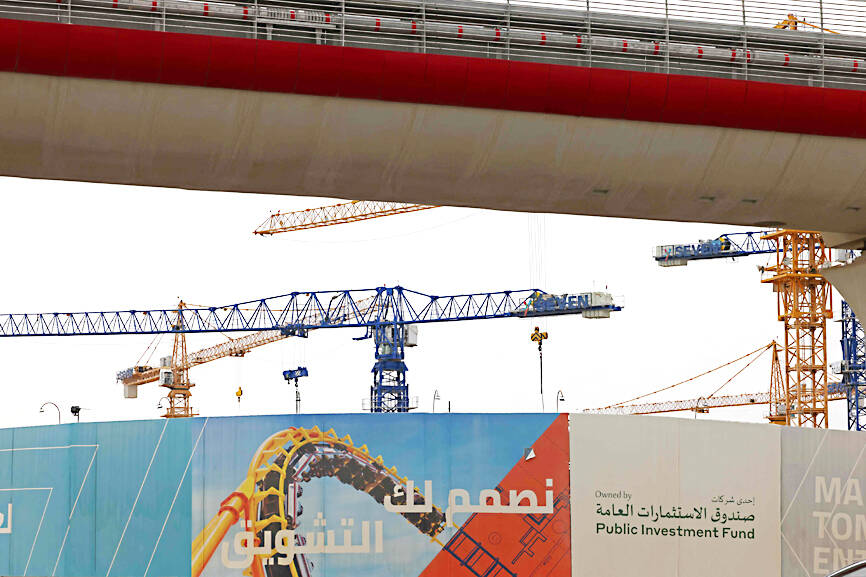Saudi Arabia’s Public Investment Fund (PIF) emerged as the world’s most active sovereign investor last year, boosting its deal activity even as most global peers, including GIC Pte and Temasek Holdings Pte, slashed spending.
PIF, as the Saudi Arabian fund is known, deployed US$31.6 billion last year, research consultancy Global SWF said.
That was higher than the US$20.7 billion it invested the previous year, an increase that contrasts with a wider trend, as globally state-owned investors deployed US$124.7 billion, about one-fifth less than a year earlier.

Photo: AFP
The declines were led by GIC, which cut the amount of capital deployed by 46 percent to US$19.9 billion and lost its spot as the world’s most active sovereign wealth fund for the first time in six years.
TemasekHoldings also reduced new investments by 53 percent to US$6.3 billion against a backdrop of volatile markets, which led the two Singapore-based investors to report worsening returns.
Much of GIC’s decline related to investments across developed markets, Global SWF said.
Singapore’s state investors continued to be active in emerging markets such as India, with deals including GIC’s US$1.4 billion joint venture with Brookfield India REIT and Temasek’s increased stake in Manipal Health Enterprises Pvt Ltd.
“Singaporean investors are being more cautious and we’ve seen that reflected in the numbers,” Global SWF said. “Gulf sovereign wealth funds have increased their domination of the global transaction activity, to the detriment of Singaporean and Canadian funds, and now represent almost 40 percent of all investment value deployed by sovereign investors.”
Overall, sovereign wealth funds controlled by the hydrocarbon-rich governments of Abu Dhabi, Saudi Arabia and Qatar took five spots on a list of the top 10 most active funds last year.
That trend could continue.
The governments of Bahrain, Kuwait, Oman, Saudi Arabia, Qatar and the United Arab Emirates are set to control about US$4.4 trillion in gross foreign assets by the end of this year, two-thirds of which is likely to be managed by sovereign wealth funds, a report issued by the Institute of International Finance last month said.
The PIF was behind the largest sovereign-backed deals last year, either directly or through its subsidiaries. These include its nearly US$5 billion acquisition of US gaming company Scopley Inc through Savvy Games Group and a US$3.6 billion acquisition of Standard Chartered PLC’s aviation leasing business through Avilease.
In September, the PIF also acquired the steel business of Sabic Basic Industries Corp in a US$3.3 billion deal that helped push the Saudi Arabian fund’s domestic investment to about 42 percent of total deployment last year.
“The variety of deals shows the unparalleled bandwidth and reach of PIF and its subsidiaries,” Global SWF said.

Merida Industry Co (美利達) has seen signs of recovery in the US and European markets this year, as customers are gradually depleting their inventories, the bicycle maker told shareholders yesterday. Given robust growth in new orders at its Taiwanese factory, coupled with its subsidiaries’ improving performance, Merida said it remains confident about the bicycle market’s prospects and expects steady growth in its core business this year. CAUTION ON CHINA However, the company must handle the Chinese market with great caution, as sales of road bikes there have declined significantly, affecting its revenue and profitability, Merida said in a statement, adding that it would

i Gasoline and diesel prices at fuel stations are this week to rise NT$0.1 per liter, as tensions in the Middle East pushed crude oil prices higher last week, CPC Corp, Taiwan (台灣中油) and Formosa Petrochemical Corp (台塑石化) said yesterday. International crude oil prices last week rose for the third consecutive week due to an escalating conflict between Israel and Iran, as the market is concerned that the situation in the Middle East might affect crude oil supply, CPC and Formosa said in separate statements. Front-month Brent crude oil futures — the international oil benchmark — rose 3.75 percent to settle at US$77.01

RISING: Strong exports, and life insurance companies’ efforts to manage currency risks indicates the NT dollar would eventually pass the 29 level, an expert said The New Taiwan dollar yesterday rallied to its strongest in three years amid inflows to the nation’s stock market and broad-based weakness in the US dollar. Exporter sales of the US currency and a repatriation of funds from local asset managers also played a role, said two traders, who asked not to be identified as they were not authorized to speak publicly. State-owned banks were seen buying the greenback yesterday, but only at a moderate scale, the traders said. The local currency gained 0.77 percent, outperforming almost all of its Asian peers, to close at NT$29.165 per US dollar in Taipei trading yesterday. The

RECORD LOW: Global firms’ increased inventories, tariff disputes not yet impacting Taiwan and new graduates not yet entering the market contributed to the decrease Taiwan’s unemployment rate last month dropped to 3.3 percent, the lowest for the month in 25 years, as strong exports and resilient domestic demand boosted hiring across various sectors, the Directorate-General of Budget, Accounting and Statistics (DGBAS) said yesterday. After seasonal adjustments, the jobless rate eased to 3.34 percent, the best performance in 24 years, suggesting a stable labor market, although a mild increase is expected with the graduation season from this month through August, the statistics agency said. “Potential shocks from tariff disputes between the US and China have yet to affect Taiwan’s job market,” Census Department Deputy Director Tan Wen-ling